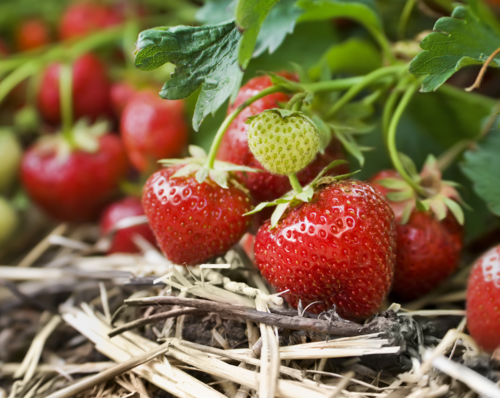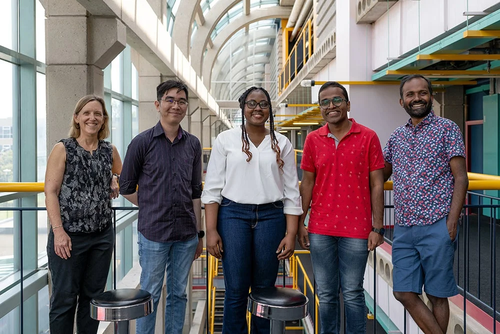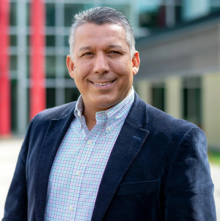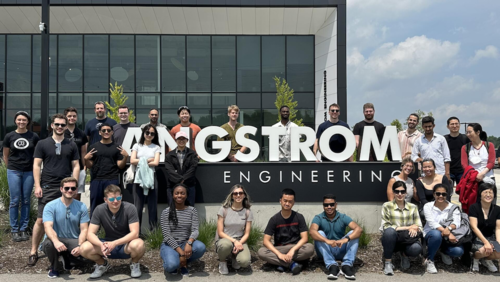The Daily Bulletin is published by Internal and Leadership Communications, part of University Communications
Contact us at bulletin@uwaterloo.ca
Submission guidelines
Editor:
Brandon Sweet
University Communications
bulletin@uwaterloo.ca

Strawberries could be fewer and more expensive because of higher temperatures caused by climate change, according to research from the University of Waterloo.
Using a new method of analysis, the researchers found that a rise in temperature of 3 degrees Fahrenheit could reduce strawberry yields by up to 40 per cent. Canada is a major importer of strawberries from California. In 2022, Canada's imports of strawberries from California were worth US$322.8 million.
“This research shows how climate change can directly impact the foods we love, emphasizing the importance of sustainable farming practices to maintain a stable food supply for everyone,” said Dr. Poornima Unnikrishnan, a postdoctoral fellow in the Department of Systems Design Engineering at Waterloo.
Sustainable farming practices could include optimizing irrigation to ensure adequate water supply during heatwaves, using drip irrigation and scheduling operations to avoid peak periods of hot weather, as well as using shading plants and installing shade structures to mitigate heat stress.
The research team included Unnikrishnan, Dr. Kumaraswamy Ponnambalam, who is also from Systems Design Engineering at Waterloo, and Dr. Fakhri Karray, from the Mohamed bin Zayed University of Artificial Intelligence in Abu Dhabi. They started their analysis with strawberries because of their popularity and notoriously short shelf life. They say these results suggest potential implications for the availability of all produce imported from California.
The researchers used a model that predicts probability of yield loss by linking air temperature anomalies and strawberry yield. This process allowed for the measurement of greater variability over time and the most accurate findings to date.
“We hope the better understanding of the influence of rising temperatures on crop yield will help in the development of sustainable agriculture responses from the government and farmers,” Ponnambalam said. “There is an urgent need for farmers to adopt new strategies to cope with global warming.”
Strawberries are one of the most lucrative commodities for the economies of California and the United States. The 2022 market for strawberries alone was worth more than US$3 billion.
The paper, Influence of Regional Temperature Anomalies on Strawberry Yield: A Study Using Multivariate Copula Analysis, appears in the journal Sustainability.

L to R: Professor Jo Atlee, postdoctoral researcher Rungroj Maipradit, recent master’s graduate Joy Idialu, master’s student Noble Saji Mathews and Professor Mei Nagappan.
A team of software engineering researchers from the Cheriton School of Computer Science has received an ACM SIGSOFT Distinguished Paper Award at MSR ’24, the 21st International Conference on Mining Software Repositories, held in Lisbon, Portugal. The prestigious award was conferred for their paper titled “Whodunit: Classifying Code as Human Authored or GPT-4 generated — A Case Study on CodeChef Problems.”
Led by recent master’s graduate Joy Idialu with her colleagues Noble Saji Mathews and Rungroj Maipradit, under the direction of Professors Jo Atlee and Mei Nagappan, the research focused on the use of code stylometry features — distinctive patterns and characteristics of programming code — to differentiate between human-authored code and code generated by artificial intelligence.
“Congratulations to Joy and her colleagues on winning an ACM SIGSOFT Distinguished Paper Award,” said University Professor Raouf Boutaba, Director of the Cheriton School of Computer Science. “While using AI assistants to generate code can increase developer productivity significantly, it is crucial for educators to assess if students have used generative AI in their assignments. This research provides important groundwork to help uphold academic integrity in programming courses.”
Artificially intelligent coding assistants like GitHub Copilot, ChatGPT and CodeWhisperer, built on large language models, are changing how programming tasks are performed. These tools can boost developer productivity by suggesting code snippets, bug fixes, refactorings, and test cases. While undoubtedly helpful in introductory programming courses, using coding assistants also raises concerns about academic integrity. Just as with written assignments, students might pass off AI-generated code as their own.
Programming courses already suffer from plagiarism and contract cheating. Current methods to detect plagiarism in student-submitted programs rely on automated similarity comparison tools. However, these tools are unlikely to detect AI-generated code because of its low similarity to student-authored code. Consequently, the goal of the team’s research was to build a classifier that can reliably distinguish between human-authored and AI-generated code. They hypothesized that code stylometry and machine learning classification can be used to distinguish between the two.
The study’s dataset used human-authored code in Python from CodeChef, an online educational and competitive programming platform, and AI-authored code, also in Python, generated by GPT-4. Their classifier outperformed baselines with an F1-score and AUC-ROC score (evaluation metrics to check a classification model’s performance) of 0.91, demonstrating its potential as a preliminary tool for identifying AI-generated code. If the code excluded what are known as gameable features — that is, code that can be easily and strategically changed or avoided with little effort to mask AI-generated code — their classifier had an F1-score and AUC-ROC score almost as high at 0.89.
They also evaluated their classifier on the difficulty of the programming task, finding almost no difference between easier and intermediate problems, with the classifier performing only slightly worse on harder problems, providing strong evidence that code stylometry is a promising approach for distinguishing between GPT-4 generated code and human-authored code.
 Attention graduate students: "The Writing and Communication Centre (WCC) wants to hear from you about your experience and needs as a graduate student!" says a note from the WCC. "We're looking for your feedback about three potential new program models to support graduate students in developing their communication skills throughout the entire life cycle of their graduate programs. We invite graduate students to participate in online focus groups to respond to and help shape these proposed new programs. Focus group participants will receive an invitation to a Teams meeting the day before the session. Participants will be entered into a draw to win one of four $25 gift cards. Share your experience to shape future WCC support for graduate students!"
Attention graduate students: "The Writing and Communication Centre (WCC) wants to hear from you about your experience and needs as a graduate student!" says a note from the WCC. "We're looking for your feedback about three potential new program models to support graduate students in developing their communication skills throughout the entire life cycle of their graduate programs. We invite graduate students to participate in online focus groups to respond to and help shape these proposed new programs. Focus group participants will receive an invitation to a Teams meeting the day before the session. Participants will be entered into a draw to win one of four $25 gift cards. Share your experience to shape future WCC support for graduate students!"
 So, what else is new? How about a new research chair on campus? Dr. Raouf Boutaba, University Professor and Director of the Cheriton School of Computer Science, has been appointed the inaugural Rogers Chair in Network Automation. "Boutaba is an internationally recognized expert in the management of resources, systems and services in both wired and wireless networks," says the article on Waterloo News. "His current research applications encompass a range of novel technologies, including network virtualization, software-defined networking, cloud and edge computing, 5G and beyond mobile communications networks and cybersecurity."
So, what else is new? How about a new research chair on campus? Dr. Raouf Boutaba, University Professor and Director of the Cheriton School of Computer Science, has been appointed the inaugural Rogers Chair in Network Automation. "Boutaba is an internationally recognized expert in the management of resources, systems and services in both wired and wireless networks," says the article on Waterloo News. "His current research applications encompass a range of novel technologies, including network virtualization, software-defined networking, cloud and edge computing, 5G and beyond mobile communications networks and cybersecurity."
"This appointment is part of a broader collaboration agreement between the University and Rogers, which began in 2019 and was renewed in 2023," the article continues. "The newly-created research chair will support cutting-edge research and development in network automation and provide hands-on training programs for Rogers’ personnel. The funding will also seek to leverage additional matching financial support from government agencies to bolster research and innovation efforts."
Read all about it in Waterloo News.

For mature audiences only: a group of researchers both local and international recently got together on campus for the 2024 NSERC CREATE Training Program for Graduate Students in Scalable 2D-Materials Architectures, otherwise known as the "2D-MATURE summer school." The program was led by Dr. Michael Pope of Chemical Engineering.
"Investment in 2D materials research holds transformative potential for an advanced, prosperous and sustainable future," says this Waterloo News feature story. "The development of these materials will contribute to more efficient energy storage systems, promote the use of renewable resources, create new markets and employment opportunities, and reduce industries’ carbon emissions."
“The future of 2D materials is promising and multifaceted with potential impacts across numerous fields,” says Pope. “Societally, these advancements can enhance the quality of life through improved consumer products, optoelectronics and energy storage materials. "This program trains graduate students as Highly Qualified Personnel to drive innovation, bridge the skills gap, foster collaboration between academia and industry, and create next-generation technology. The participants’ diverse backgrounds add enormous value to program’s content and outcomes.”
Earn your stripes: it's World Tiger Day
The Student Health Pharmacy (located in the lower level of the Student Life Centre) is offering flu shots with no appointments needed daily from 9:30 a.m. to 3:30 p.m. Call 519-746-4500 or extension 33784 for more info. COVID shots will be available on appointment basis only. You can register online at studenthealthpharmacy.ca.
Warriors Youth Summer Camps. Basketball, Baseball, Football, Hockey, Multi-Sport and Volleyball. Register today!
WatITis 2024 call for proposals, Saturday, June 15 to Friday, August 30.
Green Labs Water Month, Monday, July 1 to Wednesday, July 31.
Ministry for Seniors and Accessibility Web Accessibility User Survey to collect feedback from persons with disabilities, July 10 to July 31. Learn more about the short survey.
Last day of lectures and classes, Tuesday, July 30.
Chemistry Seminar: Polymer under confinement featuring Héloïse Thérien-Aubin, Assistant Professor, Department of Chemistry, Memorial University of Newfoundland, Tuesday, July 30, 10:30 a.m., QNC 1501.
Pre-examination study days, Wednesday, July 31 and Thursday, August 1.
NEW - Destress with Dogs, Wednesday, July 31, 12 noon to 1:00 p.m., Student Life Centre multipurpose room.
NEW - Bike101 Workshop, Wednesday, July 31, 3:00 p.m. to 4:00 p.m., SLC Bike Centre.
NEW - Final examination period, Friday, August 2 to Friday, August 16.
WICI Workshop: People Need People – A Warm Data Lab Approach, Thursday, August 1, 9:00 a.m. to 12 noon, online via Zoom.
NEW - Civic holiday, Monday, August 5, most University operations closed.
Knowledge Gathering and Sharing Consultation Sessions: 2STNBGNC+ allies who are employees (staff and faculty), Tuesday, August 6, 4:00 p.m. to 6:00 p.m., virtual. Register.
Knowledge Gathering and Sharing Consultation Sessions: 2STNBGNC+ allies who are employees (staff and faculty), Wednesday, August 7, 11:30 a.m. to 1:30 p.m., in person. Register.
Safeguarding Science: Raising awareness of security risks and mitigation tools in the research ecosystem, Wednesday, August 7, 1:00 p.m. to 2:30 p.m.
Ontario Mennonite Music Camp, Sunday, August 11 to Friday, August 23.
WICI Speaker Series: Embracing Complexity in Sustainability Transitions with Dr. Enayat Moallemi, Monday, August 19, 10:00. a.m. to 11:30 a.m., DC 1302.
NEW - Deadline to get "Fees Arranged," Tuesday, August 20.
NEW - Co-operative work term ends, Friday, August 23.
Stay up to date on service interruptions, campus construction, and other operational changes on the Plant Operations website. Upcoming service interruptions include:
ESC building electrical shutdown, August 24, 6:00 a.m. for 14 hours, building will be closed, all power to ESC will be shut down, elevators will not be functional.
The Daily Bulletin is published by Internal and Leadership Communications, part of University Communications
Contact us at bulletin@uwaterloo.ca
Submission guidelines
The University of Waterloo acknowledges that much of our work takes place on the traditional territory of the Neutral, Anishinaabeg, and Haudenosaunee peoples. Our main campus is situated on the Haldimand Tract, the land granted to the Six Nations that includes six miles on each side of the Grand River. Our active work toward reconciliation takes place across our campuses through research, learning, teaching, and community building, and is co-ordinated within the Office of Indigenous Relations.